Ford Transit Transporter vs Mercedes EQT – Differences & prices compared
Compare performance, boot space, consumption and price in one view.
Find out now: which car is the better choice for you – Ford Transit Transporter or Mercedes EQT?
The Ford Transit Transporter (Cargo Van) comes with a Diesel or Electric engine and Manuel or Automatic transmission. In comparison, the Mercedes EQT (High Roof Estate) features a Electric engine with Automatic transmission.
When it comes to boot capacity, the Ford Transit Transporter offers , while the Mercedes EQT provides 551 L – depending on how much space you need. If you’re looking for more power, decide whether the 269 HP of the Ford Transit Transporter or the 122 HP of the Mercedes EQT suits your needs better.
In terms of consumption, the values are 21.30 kWh7.90 L per 100 km for the Ford Transit Transporter, and 19.50 kWh for the Mercedes EQT.
Price-wise, the Ford Transit Transporter starts at 39900 £, while the Mercedes EQT is available from 30700 £. Compare all the details and find out which model fits your lifestyle best!
Ford Transit Transporter
The Ford Transit Transporter has long been a staple in the commercial vehicle sector, renowned for its reliability and versatility. It offers a comfortable cabin with a modern design that enhances the driving experience, making long journeys more enjoyable. With a focus on practicality, the Transit provides ample cargo space, meeting the demands of businesses and individual users alike.
details @ media.ford.com
@ media.ford.com
 @ media.ford.com
@ media.ford.com
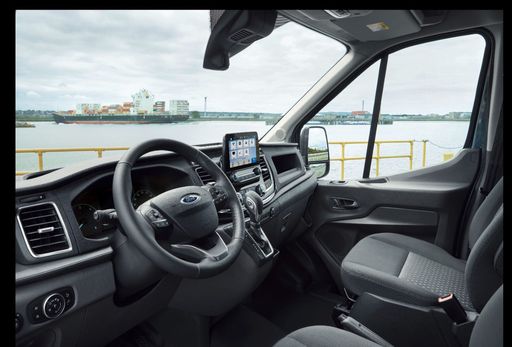 @ media.ford.com
@ media.ford.com
Mercedes EQT
The Mercedes-Benz EQT represents a new chapter in the world of electric vehicles, seamlessly combining elegance with practicality. Its interior offers a sophisticated design, featuring premium materials and advanced technology to ensure a comfortable driving experience. On the road, the EQT impresses with its smooth handling and efficient electric powertrain, making it a strong contender in the growing market of eco-friendly family cars.
details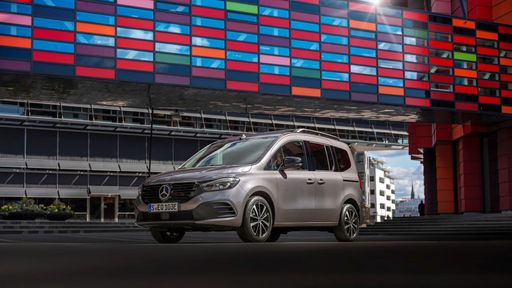 @ Mercedes-Benz
@ Mercedes-Benz
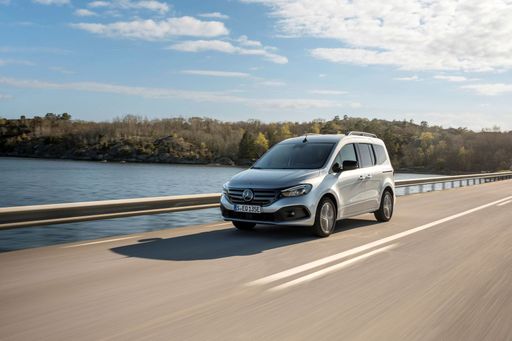 @ Mercedes-Benz
@ Mercedes-Benz
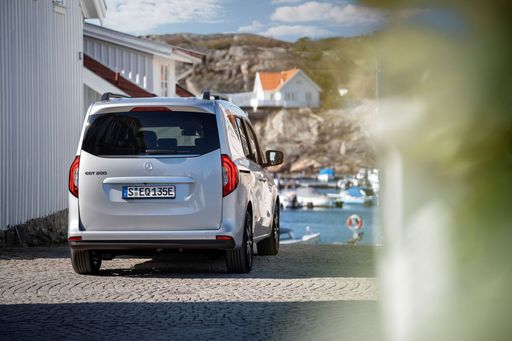 @ Mercedes-Benz
@ Mercedes-Benz
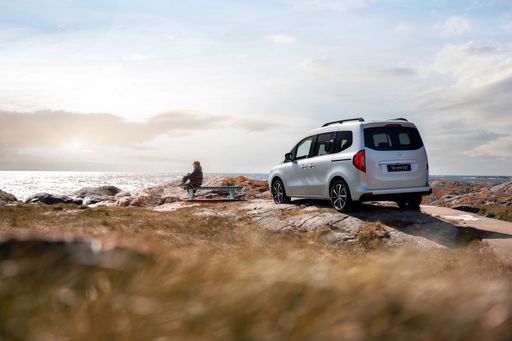 @ Mercedes-Benz
@ Mercedes-Benz
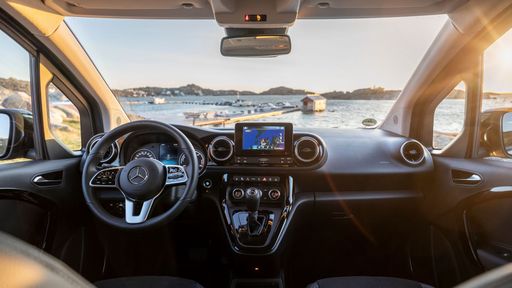 @ Mercedes-Benz
@ Mercedes-Benz

|

|
|
|
|
Costs and Consumption |
|
|---|---|
|
Price
39900 - 69100 £
|
Price
30700 - 35000 £
|
|
Consumption L/100km
7.9 - 10.3 L
|
Consumption L/100km
-
|
|
Consumption kWh/100km
21.3 - 32 kWh
|
Consumption kWh/100km
19.5 - 20.8 kWh
|
|
Electric Range
247 - 317 km
|
Electric Range
265 - 278 km
|
|
Battery Capacity
68 kWh
|
Battery Capacity
45 kWh
|
|
co2
0 - 270 g/km
|
co2
0 g/km
|
|
Fuel tank capacity
70 L
|
Fuel tank capacity
-
|
Dimensions and Body |
|
|---|---|
|
Body Type
Cargo Van
|
Body Type
High Roof Estate
|
|
Seats
3 - 6
|
Seats
5
|
|
Doors
4
|
Doors
5
|
|
Curb weight
2074 - 2765 kg
|
Curb weight
1925 - 2023 kg
|
|
Trunk capacity
-
|
Trunk capacity
242 - 551 L
|
|
Length
5531 - 6704 mm
|
Length
4498 - 4922 mm
|
|
Width
2059 mm
|
Width
1859 mm
|
|
Height
2530 - 2778 mm
|
Height
1819 - 1830 mm
|
|
Payload
735 - 2607 kg
|
Payload
457 - 531 kg
|
Engine and Performance |
|
|---|---|
|
Engine Type
Diesel, Electric
|
Engine Type
Electric
|
|
Transmission
Manuel, Automatic
|
Transmission
Automatic
|
|
Transmission Detail
Manual Gearbox, Automatic Gearbox
|
Transmission Detail
-
|
|
Drive Type
Front-Wheel Drive, Rear-Wheel Drive, All-Wheel Drive
|
Drive Type
Front-Wheel Drive
|
|
Power HP
105 - 269 HP
|
Power HP
122 HP
|
|
Acceleration 0-100km/h
-
|
Acceleration 0-100km/h
12.60 s
|
|
Max Speed
120 km/h
|
Max Speed
132 km/h
|
|
Torque
310 - 430 Nm
|
Torque
245 Nm
|
|
Number of Cylinders
4
|
Number of Cylinders
-
|
|
Power kW
77 - 198 kW
|
Power kW
90 kW
|
|
Engine capacity
1995 cm3
|
Engine capacity
-
|
General |
|
|---|---|
|
Model Year
2019 - 2024
|
Model Year
2023 - 2024
|
|
CO2 Efficiency Class
G, A
|
CO2 Efficiency Class
A
|
|
Brand
Ford
|
Brand
Mercedes-Benz
|
Ford Transit Transporter
Discovering the Ford Transit Transporter: A Blend of Tradition and Innovation
The Ford Transit Transporter has long been a staple in the commercial vehicle market, known for its reliability and versatility. As Ford continues its innovative journey, the Transit Transporter integrates modern technology and eco-friendly advancements, making it more appealing than ever. Here, we explore some of its key technical details and innovations.
Under the Bonnet: Engine Variants and Efficiency
The Ford Transit Transporter offers a variety of engine options to cater to diverse commercial needs. Among these, the 2.0 EcoBlue Diesel engine provides a robust selection of power outputs, ranging from 105 to 165 PS. Not just limited to traditional fuel, Ford also introduces the E-Transit line with electric motors generating up to 269 PS. This transition to electric is an essential step towards sustainability, achieving an impressive range of 247 to 317 km on a full charge.
Fuel Economy and Environmental Impact
When it comes to fuel efficiency, the Transit Transporter presents a competitive edge with diesel variants consuming between 7.9 to 10.3 L/100km. On the electric side, consumption levels are measured at 21.3 to 32 kWh/100km. Furthermore, the Transit’s CO2 emissions range from zero for electric models to 270 g/km for select diesel engines, placing the vehicle in varying CO2 efficiency classes from G to A.
Performance and Driving Dynamics
Designed for optimal performance, the vehicle’s torque output ranges from 310 to 430 Nm, facilitating smooth and powerful driving experiences across various terrains. The Transit Transporter boasts a maximum speed of 120 km/h, ensuring timely commutes and deliveries, crucial for business efficacy.
The Versatility of Drivetrain Options
The Ford Transit Transporter provides an array of drivetrain configurations, including front-wheel, rear-wheel and all-wheel drive. This adaptability enables the vehicle to tackle different driving conditions with ease, offering stability and resilience no matter the challenge.
Technology and Innovation on Board
Ford’s commitment to innovation is evident within the Transit Transporter’s interior. Intuitive features such as advanced driver-assistance systems, smart connectivity tools, and ergonomic seating arrangements ensure that both driver and passengers enjoy a seamless and comfortable journey, ideal for long rides or daily routines.
Crafted for Practicality and Comfort
With length variations extending from 5531 mm to 6704 mm, and height options from 2530 mm to 2778 mm, the Ford Transit Transporter offers expansive cargo space and flexible seating arrangements. Depending on the variant, seating options range from 3 to 6 seats, catering to diverse passenger and cargo needs.
A Future-Ready, Cost-Effective Choice
Price tags for the Ford Transit Transporter range from €46,589 to €80,611, accommodating different budget requirements. With monthly operation costs calculated between €1430 and €1991, the Transit remains a financially viable option for businesses seeking reliability and efficiency.
Conclusion: An Unyielding Commitment to Excellence
The Ford Transit Transporter stands as a testament to Ford’s dedication to marrying tradition with progress. With its diverse range of powertrains, technological integrations, and practical design, it continues to lead the commercial vehicle segment, ready to meet the challenges of modern mobility and sustainability.
Mercedes EQT
Revolutionising the Road: The Mercedes-Benz EQT
Mercedes-Benz continues to redefine the automotive landscape with its groundbreaking electric vehicles, and the EQT is no exception. Combining cutting-edge technology with Mercedes-Benz's celebrated design ethos, the EQT is poised to make a significant impact in the world of electric transport.
Electrifying Performance
At the heart of the EQT's performance is its robust electric motor, delivering a commendable 122 PS (90 kW). This powertrain is perfectly complemented by a smooth and efficient automatic transmission, ensuring that all journeys are as seamless as they are enjoyable. With a torque of 245 Nm, the EQT is able to effortlessly tackle city streets and motorways alike.
Efficiency and Range
One of the standout features of the EQT is its impressive efficiency. With an energy consumption range of 19.5 to 20.8 kWh per 100 km, this model offers an electric range between 265 and 278 km, making it an ideal companion for both urban commutes and weekend getaways. The battery capacity allows for a balance between range and weight, optimising the vehicle’s performance.
Designed for Versatility
True to its class as a high-roofed estate, the EQT offers impressive versatility. Its spacious interior accommodates five seats comfortably, while offering a luggage capacity ranging from 242 to 551 litres, perfect for family trips or transporting sports equipment. With a total length spanning from 4498 mm to 4922 mm, the EQT maintains practicality without compromising style.
Advanced Safety and Technology
The EQT is equipped with a plethora of safety features and driving aids, ensuring that each journey is not only comfortable but also secure. The model boasts excellent CO2 efficiency with a classification of A, underscoring its commitment to a sustainable future.
Customisable Luxury
Mercedes-Benz offers various trim levels and customisation options such as Advanced Plus, Premium, and Premium Plus, enabling owners to personalise their EQT according to their preferences. This personalisation, combined with the car's already comprehensive standard features, provides an exquisite driving experience.
Economics of Electric Driving
While the initial investment ranges between €39,623 and €44,906, the EQT offers competitive running costs with an estimated monthly expenditure between €1,042 and €1,094 and a per-kilometre cost ranging from 41.7 to 43.8 cents. These economic efficiencies make the EQT an attractive proposition for those looking to reduce their carbon footprint.
Conclusion: A Visionary Future
The Mercedes-Benz EQT stands out as a pioneering force in the realm of electric vehicles, offering a blend of performance, practicality, and sustainability. As the automotive industry continues to evolve, the EQT represents Mercedes-Benz's commitment to innovation and environmental responsibility. With its refined elegance and forward-thinking technology, the EQT is more than just a vehicle—it's a glimpse into the future of driving.
Which drive types are available for the Ford Transit Transporter?
Available as Front-Wheel Drive, Rear-Wheel Drive or All-Wheel Drive.
The prices and data displayed are estimates based on German list prices and may vary by country. This information is not legally binding.
